Entrepreneurship and Small Business Management: SMEs & Economy
VerifiedAdded on 2023/01/19
|17
|4975
|20
Report
AI Summary
This report provides an overview of entrepreneurship and small business management, focusing on the role of Small and Medium Enterprises (SMEs) in the UK economy. It begins by explaining various types of entrepreneurship ventures, including small, large, and social enterprises, and their relationship with entrepreneurship typologies like lifestyle and growth enterprises. The report then assesses the influence of SMEs on the UK economy, supported by statistics and data, highlighting their impact at local, regional, and national levels, especially in the context of Brexit. Furthermore, it discusses the value of business start-ups and small businesses in the growth of the social economy, emphasizing job creation, increased living standards, and overall economic growth. The report also differentiates the traits, skills, and characteristics of successful business entrepreneurs from those of business managers and explores how entrepreneurship impacts mindset and motivation. Finally, it examines how experience and background can either foster or hinder entrepreneurship, using relevant examples, highlighting the importance of support for new start-ups and small businesses to stabilize the economy.
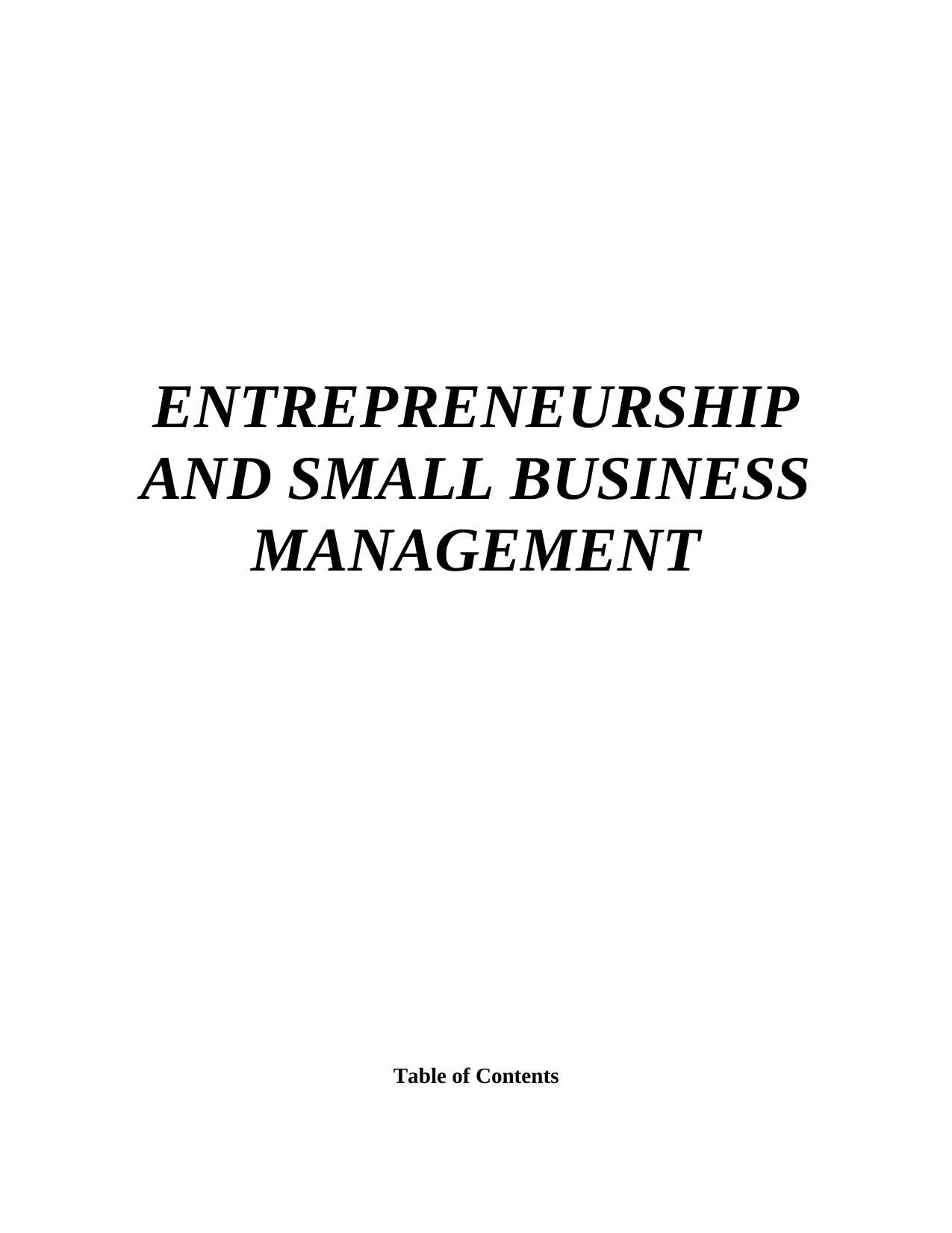
ENTREPRENEURSHIP
AND SMALL BUSINESS
MANAGEMENT
Table of Contents
AND SMALL BUSINESS
MANAGEMENT
Table of Contents
Paraphrase This Document
Need a fresh take? Get an instant paraphrase of this document with our AI Paraphraser
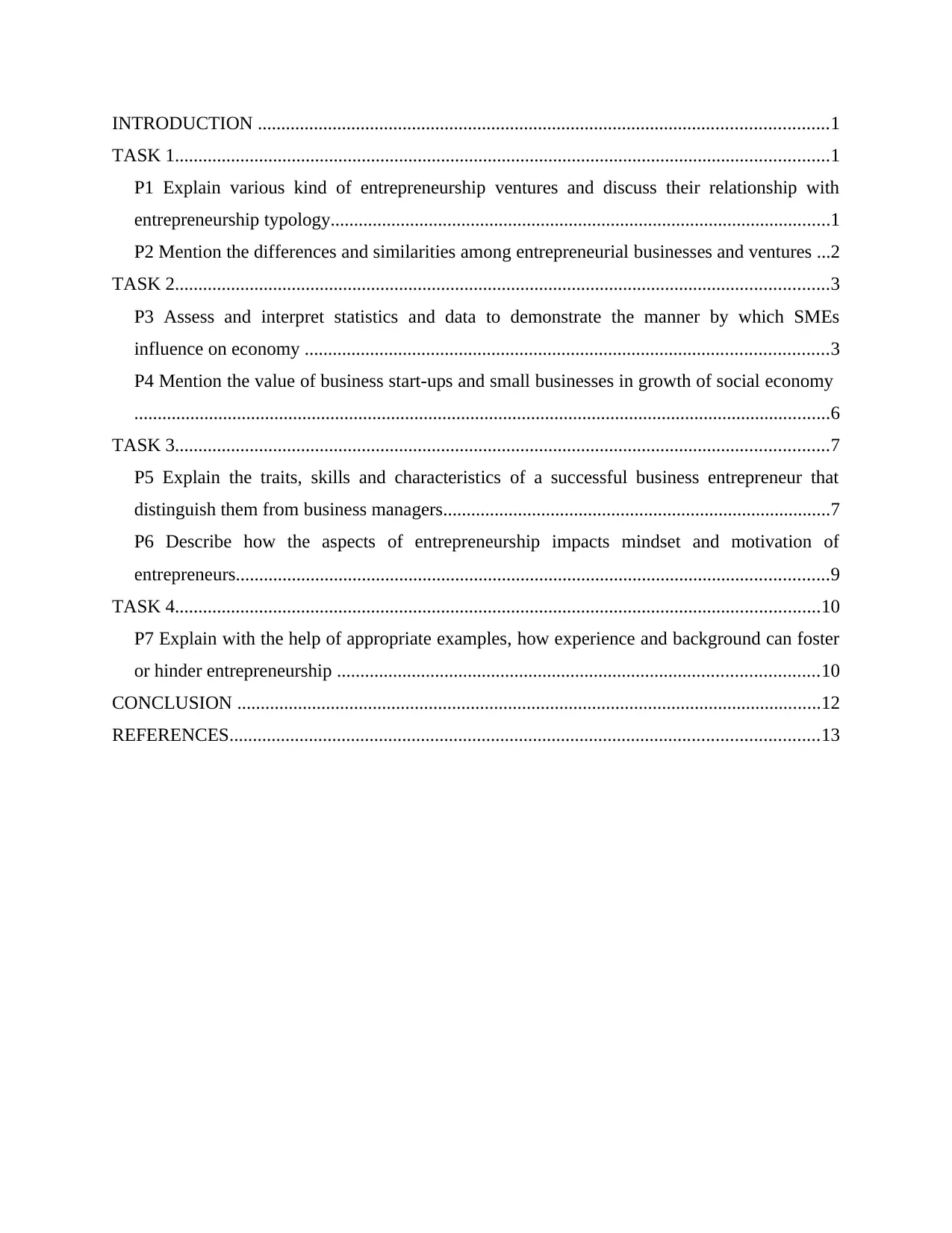
INTRODUCTION ..........................................................................................................................1
TASK 1............................................................................................................................................1
P1 Explain various kind of entrepreneurship ventures and discuss their relationship with
entrepreneurship typology...........................................................................................................1
P2 Mention the differences and similarities among entrepreneurial businesses and ventures ...2
TASK 2............................................................................................................................................3
P3 Assess and interpret statistics and data to demonstrate the manner by which SMEs
influence on economy ................................................................................................................3
P4 Mention the value of business start-ups and small businesses in growth of social economy
.....................................................................................................................................................6
TASK 3............................................................................................................................................7
P5 Explain the traits, skills and characteristics of a successful business entrepreneur that
distinguish them from business managers...................................................................................7
P6 Describe how the aspects of entrepreneurship impacts mindset and motivation of
entrepreneurs...............................................................................................................................9
TASK 4..........................................................................................................................................10
P7 Explain with the help of appropriate examples, how experience and background can foster
or hinder entrepreneurship .......................................................................................................10
CONCLUSION .............................................................................................................................12
REFERENCES..............................................................................................................................13
TASK 1............................................................................................................................................1
P1 Explain various kind of entrepreneurship ventures and discuss their relationship with
entrepreneurship typology...........................................................................................................1
P2 Mention the differences and similarities among entrepreneurial businesses and ventures ...2
TASK 2............................................................................................................................................3
P3 Assess and interpret statistics and data to demonstrate the manner by which SMEs
influence on economy ................................................................................................................3
P4 Mention the value of business start-ups and small businesses in growth of social economy
.....................................................................................................................................................6
TASK 3............................................................................................................................................7
P5 Explain the traits, skills and characteristics of a successful business entrepreneur that
distinguish them from business managers...................................................................................7
P6 Describe how the aspects of entrepreneurship impacts mindset and motivation of
entrepreneurs...............................................................................................................................9
TASK 4..........................................................................................................................................10
P7 Explain with the help of appropriate examples, how experience and background can foster
or hinder entrepreneurship .......................................................................................................10
CONCLUSION .............................................................................................................................12
REFERENCES..............................................................................................................................13
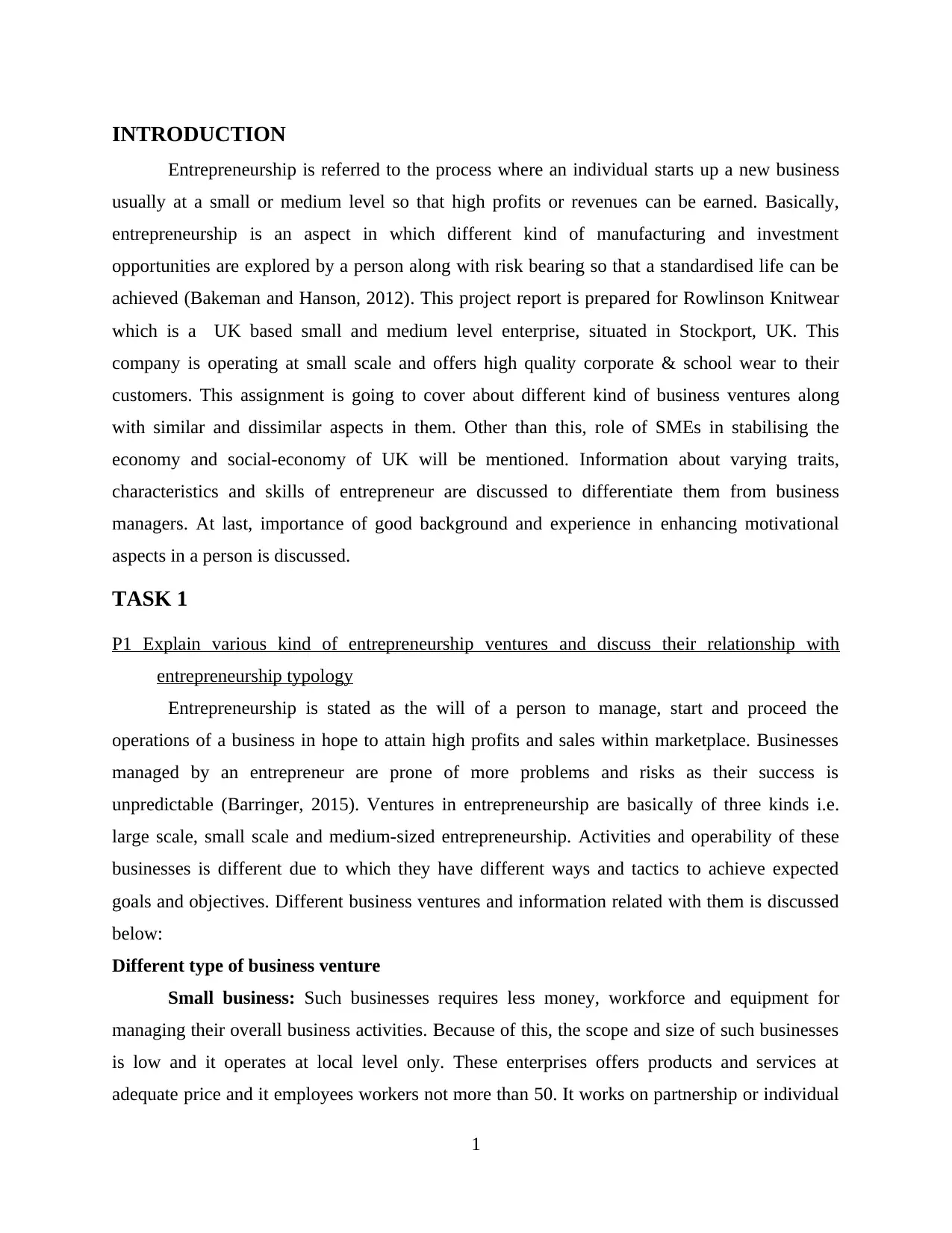
INTRODUCTION
Entrepreneurship is referred to the process where an individual starts up a new business
usually at a small or medium level so that high profits or revenues can be earned. Basically,
entrepreneurship is an aspect in which different kind of manufacturing and investment
opportunities are explored by a person along with risk bearing so that a standardised life can be
achieved (Bakeman and Hanson, 2012). This project report is prepared for Rowlinson Knitwear
which is a UK based small and medium level enterprise, situated in Stockport, UK. This
company is operating at small scale and offers high quality corporate & school wear to their
customers. This assignment is going to cover about different kind of business ventures along
with similar and dissimilar aspects in them. Other than this, role of SMEs in stabilising the
economy and social-economy of UK will be mentioned. Information about varying traits,
characteristics and skills of entrepreneur are discussed to differentiate them from business
managers. At last, importance of good background and experience in enhancing motivational
aspects in a person is discussed.
TASK 1
P1 Explain various kind of entrepreneurship ventures and discuss their relationship with
entrepreneurship typology
Entrepreneurship is stated as the will of a person to manage, start and proceed the
operations of a business in hope to attain high profits and sales within marketplace. Businesses
managed by an entrepreneur are prone of more problems and risks as their success is
unpredictable (Barringer, 2015). Ventures in entrepreneurship are basically of three kinds i.e.
large scale, small scale and medium-sized entrepreneurship. Activities and operability of these
businesses is different due to which they have different ways and tactics to achieve expected
goals and objectives. Different business ventures and information related with them is discussed
below:
Different type of business venture
Small business: Such businesses requires less money, workforce and equipment for
managing their overall business activities. Because of this, the scope and size of such businesses
is low and it operates at local level only. These enterprises offers products and services at
adequate price and it employees workers not more than 50. It works on partnership or individual
1
Entrepreneurship is referred to the process where an individual starts up a new business
usually at a small or medium level so that high profits or revenues can be earned. Basically,
entrepreneurship is an aspect in which different kind of manufacturing and investment
opportunities are explored by a person along with risk bearing so that a standardised life can be
achieved (Bakeman and Hanson, 2012). This project report is prepared for Rowlinson Knitwear
which is a UK based small and medium level enterprise, situated in Stockport, UK. This
company is operating at small scale and offers high quality corporate & school wear to their
customers. This assignment is going to cover about different kind of business ventures along
with similar and dissimilar aspects in them. Other than this, role of SMEs in stabilising the
economy and social-economy of UK will be mentioned. Information about varying traits,
characteristics and skills of entrepreneur are discussed to differentiate them from business
managers. At last, importance of good background and experience in enhancing motivational
aspects in a person is discussed.
TASK 1
P1 Explain various kind of entrepreneurship ventures and discuss their relationship with
entrepreneurship typology
Entrepreneurship is stated as the will of a person to manage, start and proceed the
operations of a business in hope to attain high profits and sales within marketplace. Businesses
managed by an entrepreneur are prone of more problems and risks as their success is
unpredictable (Barringer, 2015). Ventures in entrepreneurship are basically of three kinds i.e.
large scale, small scale and medium-sized entrepreneurship. Activities and operability of these
businesses is different due to which they have different ways and tactics to achieve expected
goals and objectives. Different business ventures and information related with them is discussed
below:
Different type of business venture
Small business: Such businesses requires less money, workforce and equipment for
managing their overall business activities. Because of this, the scope and size of such businesses
is low and it operates at local level only. These enterprises offers products and services at
adequate price and it employees workers not more than 50. It works on partnership or individual
1
⊘ This is a preview!⊘
Do you want full access?
Subscribe today to unlock all pages.

Trusted by 1+ million students worldwide
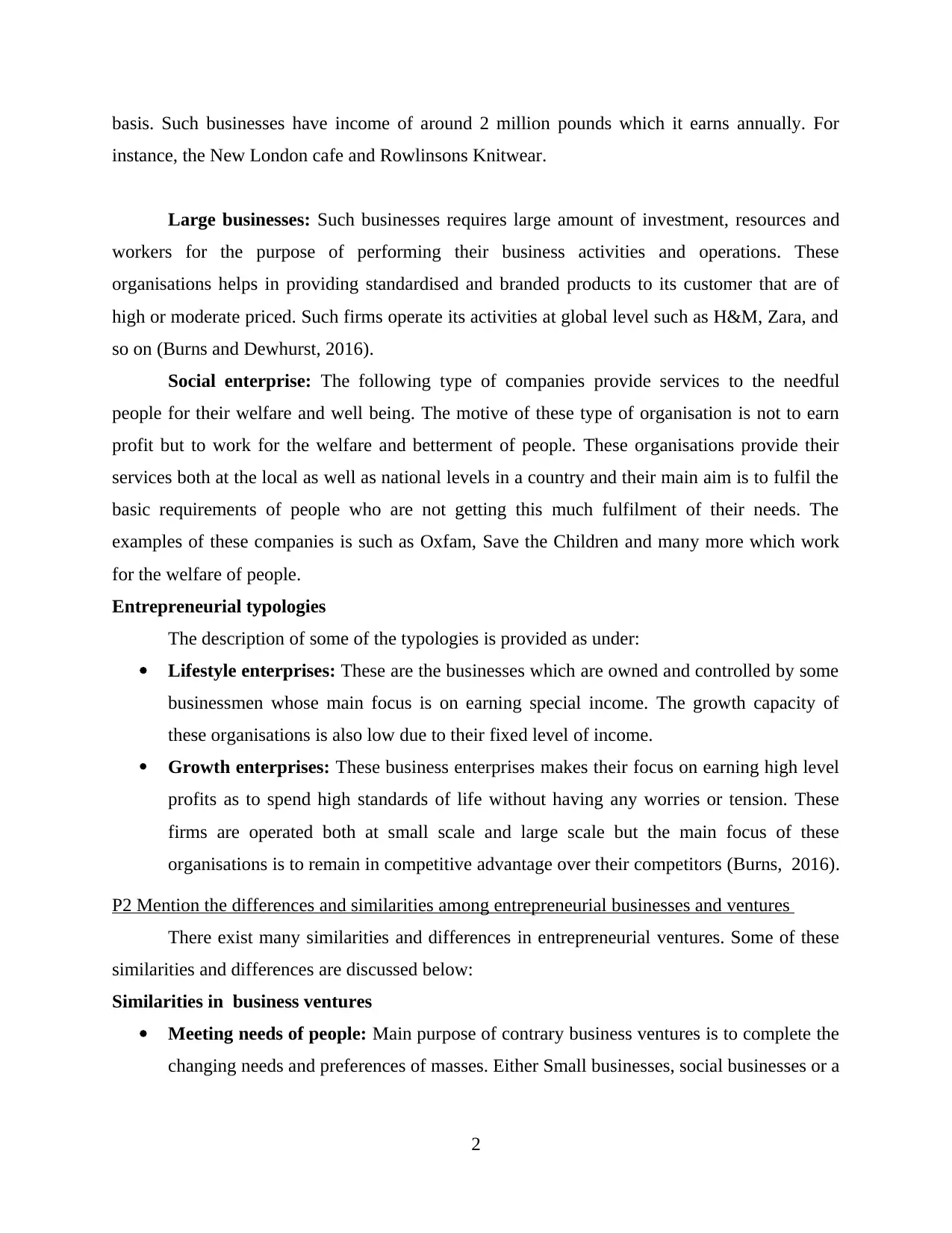
basis. Such businesses have income of around 2 million pounds which it earns annually. For
instance, the New London cafe and Rowlinsons Knitwear.
Large businesses: Such businesses requires large amount of investment, resources and
workers for the purpose of performing their business activities and operations. These
organisations helps in providing standardised and branded products to its customer that are of
high or moderate priced. Such firms operate its activities at global level such as H&M, Zara, and
so on (Burns and Dewhurst, 2016).
Social enterprise: The following type of companies provide services to the needful
people for their welfare and well being. The motive of these type of organisation is not to earn
profit but to work for the welfare and betterment of people. These organisations provide their
services both at the local as well as national levels in a country and their main aim is to fulfil the
basic requirements of people who are not getting this much fulfilment of their needs. The
examples of these companies is such as Oxfam, Save the Children and many more which work
for the welfare of people.
Entrepreneurial typologies
The description of some of the typologies is provided as under:
Lifestyle enterprises: These are the businesses which are owned and controlled by some
businessmen whose main focus is on earning special income. The growth capacity of
these organisations is also low due to their fixed level of income.
Growth enterprises: These business enterprises makes their focus on earning high level
profits as to spend high standards of life without having any worries or tension. These
firms are operated both at small scale and large scale but the main focus of these
organisations is to remain in competitive advantage over their competitors (Burns, 2016).
P2 Mention the differences and similarities among entrepreneurial businesses and ventures
There exist many similarities and differences in entrepreneurial ventures. Some of these
similarities and differences are discussed below:
Similarities in business ventures
Meeting needs of people: Main purpose of contrary business ventures is to complete the
changing needs and preferences of masses. Either Small businesses, social businesses or a
2
instance, the New London cafe and Rowlinsons Knitwear.
Large businesses: Such businesses requires large amount of investment, resources and
workers for the purpose of performing their business activities and operations. These
organisations helps in providing standardised and branded products to its customer that are of
high or moderate priced. Such firms operate its activities at global level such as H&M, Zara, and
so on (Burns and Dewhurst, 2016).
Social enterprise: The following type of companies provide services to the needful
people for their welfare and well being. The motive of these type of organisation is not to earn
profit but to work for the welfare and betterment of people. These organisations provide their
services both at the local as well as national levels in a country and their main aim is to fulfil the
basic requirements of people who are not getting this much fulfilment of their needs. The
examples of these companies is such as Oxfam, Save the Children and many more which work
for the welfare of people.
Entrepreneurial typologies
The description of some of the typologies is provided as under:
Lifestyle enterprises: These are the businesses which are owned and controlled by some
businessmen whose main focus is on earning special income. The growth capacity of
these organisations is also low due to their fixed level of income.
Growth enterprises: These business enterprises makes their focus on earning high level
profits as to spend high standards of life without having any worries or tension. These
firms are operated both at small scale and large scale but the main focus of these
organisations is to remain in competitive advantage over their competitors (Burns, 2016).
P2 Mention the differences and similarities among entrepreneurial businesses and ventures
There exist many similarities and differences in entrepreneurial ventures. Some of these
similarities and differences are discussed below:
Similarities in business ventures
Meeting needs of people: Main purpose of contrary business ventures is to complete the
changing needs and preferences of masses. Either Small businesses, social businesses or a
2
Paraphrase This Document
Need a fresh take? Get an instant paraphrase of this document with our AI Paraphraser
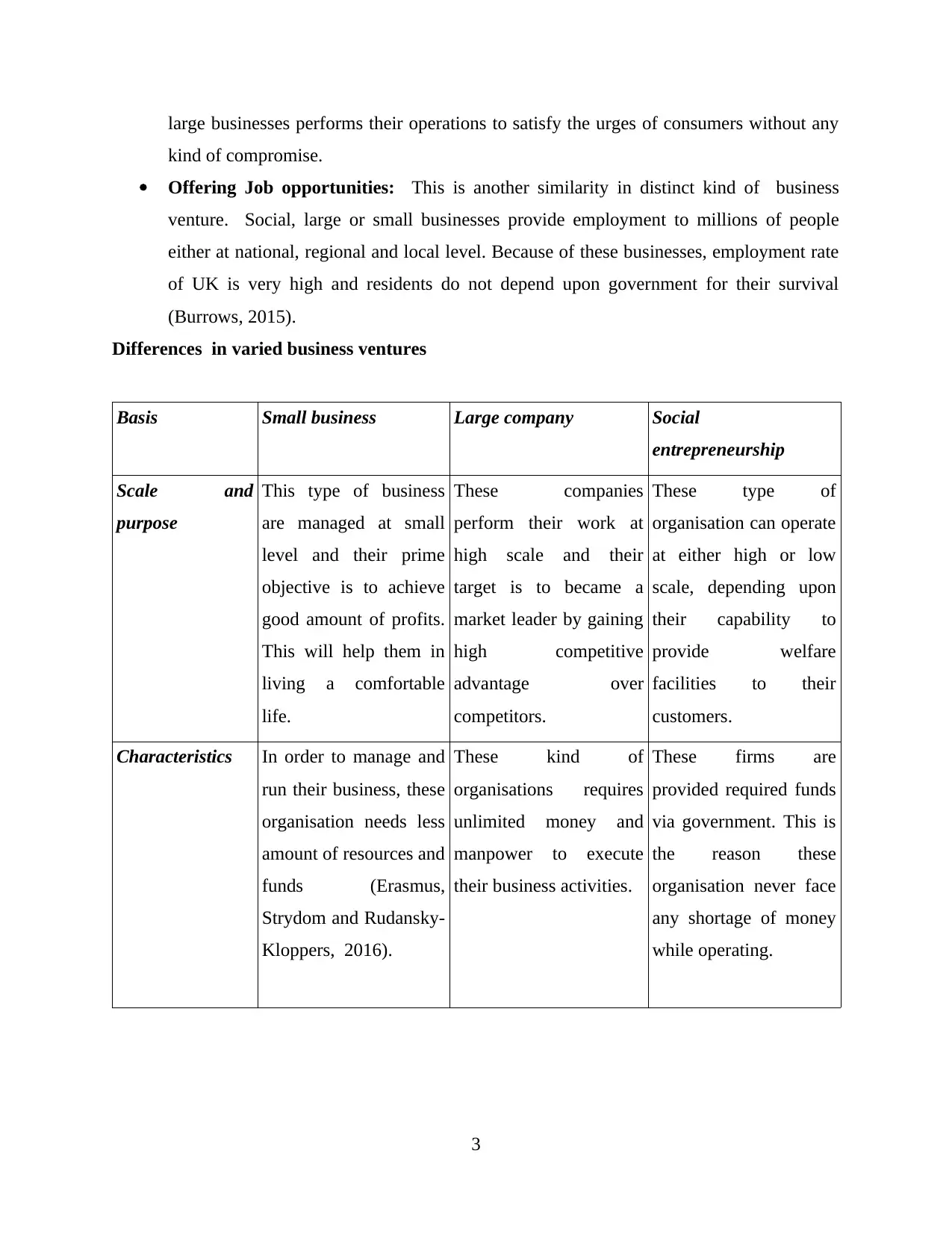
large businesses performs their operations to satisfy the urges of consumers without any
kind of compromise.
Offering Job opportunities: This is another similarity in distinct kind of business
venture. Social, large or small businesses provide employment to millions of people
either at national, regional and local level. Because of these businesses, employment rate
of UK is very high and residents do not depend upon government for their survival
(Burrows, 2015).
Differences in varied business ventures
Basis Small business Large company Social
entrepreneurship
Scale and
purpose
This type of business
are managed at small
level and their prime
objective is to achieve
good amount of profits.
This will help them in
living a comfortable
life.
These companies
perform their work at
high scale and their
target is to became a
market leader by gaining
high competitive
advantage over
competitors.
These type of
organisation can operate
at either high or low
scale, depending upon
their capability to
provide welfare
facilities to their
customers.
Characteristics In order to manage and
run their business, these
organisation needs less
amount of resources and
funds (Erasmus,
Strydom and Rudansky-
Kloppers, 2016).
These kind of
organisations requires
unlimited money and
manpower to execute
their business activities.
These firms are
provided required funds
via government. This is
the reason these
organisation never face
any shortage of money
while operating.
3
kind of compromise.
Offering Job opportunities: This is another similarity in distinct kind of business
venture. Social, large or small businesses provide employment to millions of people
either at national, regional and local level. Because of these businesses, employment rate
of UK is very high and residents do not depend upon government for their survival
(Burrows, 2015).
Differences in varied business ventures
Basis Small business Large company Social
entrepreneurship
Scale and
purpose
This type of business
are managed at small
level and their prime
objective is to achieve
good amount of profits.
This will help them in
living a comfortable
life.
These companies
perform their work at
high scale and their
target is to became a
market leader by gaining
high competitive
advantage over
competitors.
These type of
organisation can operate
at either high or low
scale, depending upon
their capability to
provide welfare
facilities to their
customers.
Characteristics In order to manage and
run their business, these
organisation needs less
amount of resources and
funds (Erasmus,
Strydom and Rudansky-
Kloppers, 2016).
These kind of
organisations requires
unlimited money and
manpower to execute
their business activities.
These firms are
provided required funds
via government. This is
the reason these
organisation never face
any shortage of money
while operating.
3
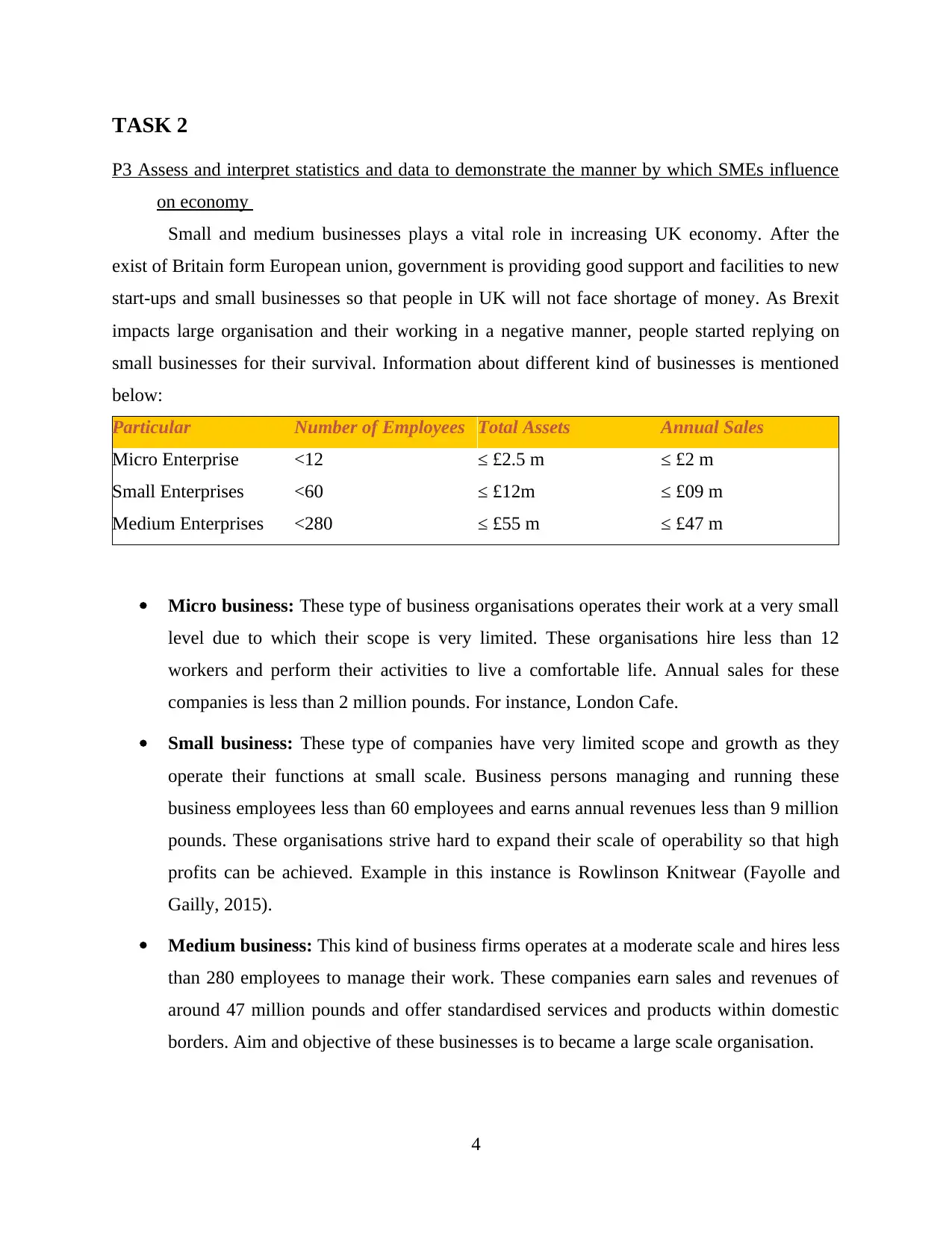
TASK 2
P3 Assess and interpret statistics and data to demonstrate the manner by which SMEs influence
on economy
Small and medium businesses plays a vital role in increasing UK economy. After the
exist of Britain form European union, government is providing good support and facilities to new
start-ups and small businesses so that people in UK will not face shortage of money. As Brexit
impacts large organisation and their working in a negative manner, people started replying on
small businesses for their survival. Information about different kind of businesses is mentioned
below:
Particular Number of Employees Total Assets Annual Sales
Micro Enterprise <12 ≤ £2.5 m ≤ £2 m
Small Enterprises <60 ≤ £12m ≤ £09 m
Medium Enterprises <280 ≤ £55 m ≤ £47 m
Micro business: These type of business organisations operates their work at a very small
level due to which their scope is very limited. These organisations hire less than 12
workers and perform their activities to live a comfortable life. Annual sales for these
companies is less than 2 million pounds. For instance, London Cafe.
Small business: These type of companies have very limited scope and growth as they
operate their functions at small scale. Business persons managing and running these
business employees less than 60 employees and earns annual revenues less than 9 million
pounds. These organisations strive hard to expand their scale of operability so that high
profits can be achieved. Example in this instance is Rowlinson Knitwear (Fayolle and
Gailly, 2015).
Medium business: This kind of business firms operates at a moderate scale and hires less
than 280 employees to manage their work. These companies earn sales and revenues of
around 47 million pounds and offer standardised services and products within domestic
borders. Aim and objective of these businesses is to became a large scale organisation.
4
P3 Assess and interpret statistics and data to demonstrate the manner by which SMEs influence
on economy
Small and medium businesses plays a vital role in increasing UK economy. After the
exist of Britain form European union, government is providing good support and facilities to new
start-ups and small businesses so that people in UK will not face shortage of money. As Brexit
impacts large organisation and their working in a negative manner, people started replying on
small businesses for their survival. Information about different kind of businesses is mentioned
below:
Particular Number of Employees Total Assets Annual Sales
Micro Enterprise <12 ≤ £2.5 m ≤ £2 m
Small Enterprises <60 ≤ £12m ≤ £09 m
Medium Enterprises <280 ≤ £55 m ≤ £47 m
Micro business: These type of business organisations operates their work at a very small
level due to which their scope is very limited. These organisations hire less than 12
workers and perform their activities to live a comfortable life. Annual sales for these
companies is less than 2 million pounds. For instance, London Cafe.
Small business: These type of companies have very limited scope and growth as they
operate their functions at small scale. Business persons managing and running these
business employees less than 60 employees and earns annual revenues less than 9 million
pounds. These organisations strive hard to expand their scale of operability so that high
profits can be achieved. Example in this instance is Rowlinson Knitwear (Fayolle and
Gailly, 2015).
Medium business: This kind of business firms operates at a moderate scale and hires less
than 280 employees to manage their work. These companies earn sales and revenues of
around 47 million pounds and offer standardised services and products within domestic
borders. Aim and objective of these businesses is to became a large scale organisation.
4
⊘ This is a preview!⊘
Do you want full access?
Subscribe today to unlock all pages.

Trusted by 1+ million students worldwide
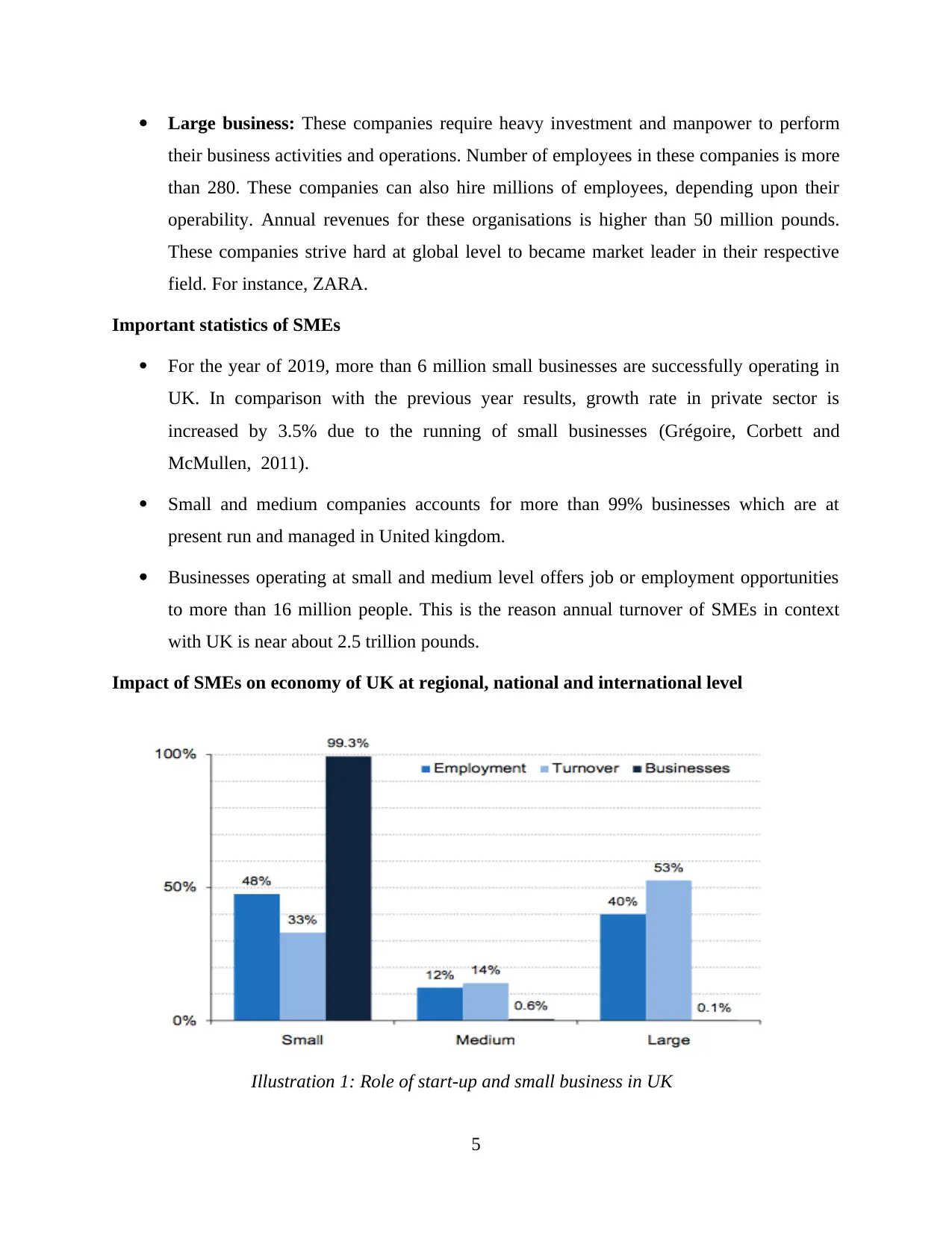
Large business: These companies require heavy investment and manpower to perform
their business activities and operations. Number of employees in these companies is more
than 280. These companies can also hire millions of employees, depending upon their
operability. Annual revenues for these organisations is higher than 50 million pounds.
These companies strive hard at global level to became market leader in their respective
field. For instance, ZARA.
Important statistics of SMEs
For the year of 2019, more than 6 million small businesses are successfully operating in
UK. In comparison with the previous year results, growth rate in private sector is
increased by 3.5% due to the running of small businesses (Grégoire, Corbett and
McMullen, 2011).
Small and medium companies accounts for more than 99% businesses which are at
present run and managed in United kingdom.
Businesses operating at small and medium level offers job or employment opportunities
to more than 16 million people. This is the reason annual turnover of SMEs in context
with UK is near about 2.5 trillion pounds.
Impact of SMEs on economy of UK at regional, national and international level
Illustration 1: Role of start-up and small business in UK
5
their business activities and operations. Number of employees in these companies is more
than 280. These companies can also hire millions of employees, depending upon their
operability. Annual revenues for these organisations is higher than 50 million pounds.
These companies strive hard at global level to became market leader in their respective
field. For instance, ZARA.
Important statistics of SMEs
For the year of 2019, more than 6 million small businesses are successfully operating in
UK. In comparison with the previous year results, growth rate in private sector is
increased by 3.5% due to the running of small businesses (Grégoire, Corbett and
McMullen, 2011).
Small and medium companies accounts for more than 99% businesses which are at
present run and managed in United kingdom.
Businesses operating at small and medium level offers job or employment opportunities
to more than 16 million people. This is the reason annual turnover of SMEs in context
with UK is near about 2.5 trillion pounds.
Impact of SMEs on economy of UK at regional, national and international level
Illustration 1: Role of start-up and small business in UK
5
Paraphrase This Document
Need a fresh take? Get an instant paraphrase of this document with our AI Paraphraser
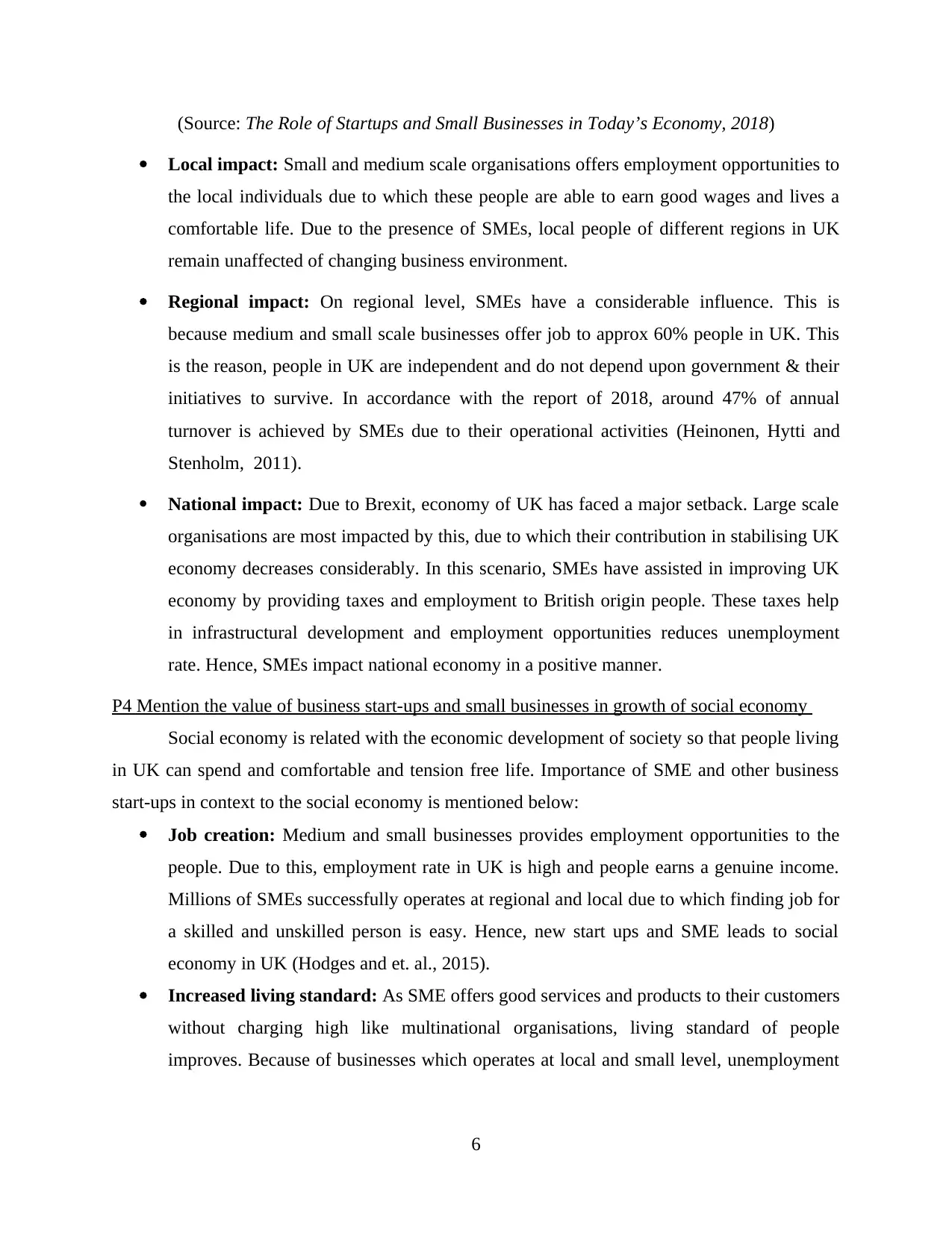
(Source: The Role of Startups and Small Businesses in Today’s Economy, 2018)
Local impact: Small and medium scale organisations offers employment opportunities to
the local individuals due to which these people are able to earn good wages and lives a
comfortable life. Due to the presence of SMEs, local people of different regions in UK
remain unaffected of changing business environment.
Regional impact: On regional level, SMEs have a considerable influence. This is
because medium and small scale businesses offer job to approx 60% people in UK. This
is the reason, people in UK are independent and do not depend upon government & their
initiatives to survive. In accordance with the report of 2018, around 47% of annual
turnover is achieved by SMEs due to their operational activities (Heinonen, Hytti and
Stenholm, 2011).
National impact: Due to Brexit, economy of UK has faced a major setback. Large scale
organisations are most impacted by this, due to which their contribution in stabilising UK
economy decreases considerably. In this scenario, SMEs have assisted in improving UK
economy by providing taxes and employment to British origin people. These taxes help
in infrastructural development and employment opportunities reduces unemployment
rate. Hence, SMEs impact national economy in a positive manner.
P4 Mention the value of business start-ups and small businesses in growth of social economy
Social economy is related with the economic development of society so that people living
in UK can spend and comfortable and tension free life. Importance of SME and other business
start-ups in context to the social economy is mentioned below:
Job creation: Medium and small businesses provides employment opportunities to the
people. Due to this, employment rate in UK is high and people earns a genuine income.
Millions of SMEs successfully operates at regional and local due to which finding job for
a skilled and unskilled person is easy. Hence, new start ups and SME leads to social
economy in UK (Hodges and et. al., 2015).
Increased living standard: As SME offers good services and products to their customers
without charging high like multinational organisations, living standard of people
improves. Because of businesses which operates at local and small level, unemployment
6
Local impact: Small and medium scale organisations offers employment opportunities to
the local individuals due to which these people are able to earn good wages and lives a
comfortable life. Due to the presence of SMEs, local people of different regions in UK
remain unaffected of changing business environment.
Regional impact: On regional level, SMEs have a considerable influence. This is
because medium and small scale businesses offer job to approx 60% people in UK. This
is the reason, people in UK are independent and do not depend upon government & their
initiatives to survive. In accordance with the report of 2018, around 47% of annual
turnover is achieved by SMEs due to their operational activities (Heinonen, Hytti and
Stenholm, 2011).
National impact: Due to Brexit, economy of UK has faced a major setback. Large scale
organisations are most impacted by this, due to which their contribution in stabilising UK
economy decreases considerably. In this scenario, SMEs have assisted in improving UK
economy by providing taxes and employment to British origin people. These taxes help
in infrastructural development and employment opportunities reduces unemployment
rate. Hence, SMEs impact national economy in a positive manner.
P4 Mention the value of business start-ups and small businesses in growth of social economy
Social economy is related with the economic development of society so that people living
in UK can spend and comfortable and tension free life. Importance of SME and other business
start-ups in context to the social economy is mentioned below:
Job creation: Medium and small businesses provides employment opportunities to the
people. Due to this, employment rate in UK is high and people earns a genuine income.
Millions of SMEs successfully operates at regional and local due to which finding job for
a skilled and unskilled person is easy. Hence, new start ups and SME leads to social
economy in UK (Hodges and et. al., 2015).
Increased living standard: As SME offers good services and products to their customers
without charging high like multinational organisations, living standard of people
improves. Because of businesses which operates at local and small level, unemployment
6
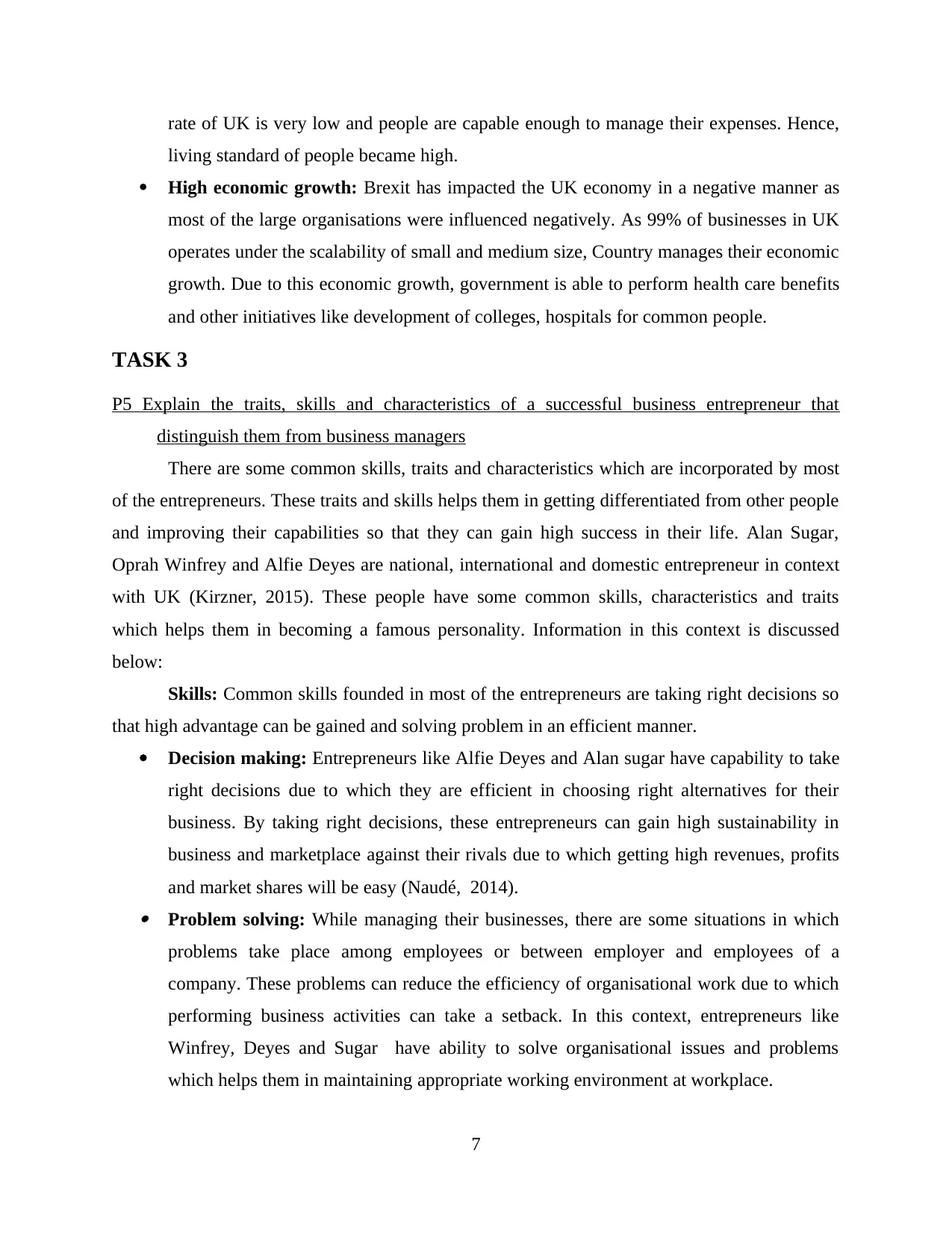
rate of UK is very low and people are capable enough to manage their expenses. Hence,
living standard of people became high.
High economic growth: Brexit has impacted the UK economy in a negative manner as
most of the large organisations were influenced negatively. As 99% of businesses in UK
operates under the scalability of small and medium size, Country manages their economic
growth. Due to this economic growth, government is able to perform health care benefits
and other initiatives like development of colleges, hospitals for common people.
TASK 3
P5 Explain the traits, skills and characteristics of a successful business entrepreneur that
distinguish them from business managers
There are some common skills, traits and characteristics which are incorporated by most
of the entrepreneurs. These traits and skills helps them in getting differentiated from other people
and improving their capabilities so that they can gain high success in their life. Alan Sugar,
Oprah Winfrey and Alfie Deyes are national, international and domestic entrepreneur in context
with UK (Kirzner, 2015). These people have some common skills, characteristics and traits
which helps them in becoming a famous personality. Information in this context is discussed
below:
Skills: Common skills founded in most of the entrepreneurs are taking right decisions so
that high advantage can be gained and solving problem in an efficient manner.
Decision making: Entrepreneurs like Alfie Deyes and Alan sugar have capability to take
right decisions due to which they are efficient in choosing right alternatives for their
business. By taking right decisions, these entrepreneurs can gain high sustainability in
business and marketplace against their rivals due to which getting high revenues, profits
and market shares will be easy (Naudé, 2014). Problem solving: While managing their businesses, there are some situations in which
problems take place among employees or between employer and employees of a
company. These problems can reduce the efficiency of organisational work due to which
performing business activities can take a setback. In this context, entrepreneurs like
Winfrey, Deyes and Sugar have ability to solve organisational issues and problems
which helps them in maintaining appropriate working environment at workplace.
7
living standard of people became high.
High economic growth: Brexit has impacted the UK economy in a negative manner as
most of the large organisations were influenced negatively. As 99% of businesses in UK
operates under the scalability of small and medium size, Country manages their economic
growth. Due to this economic growth, government is able to perform health care benefits
and other initiatives like development of colleges, hospitals for common people.
TASK 3
P5 Explain the traits, skills and characteristics of a successful business entrepreneur that
distinguish them from business managers
There are some common skills, traits and characteristics which are incorporated by most
of the entrepreneurs. These traits and skills helps them in getting differentiated from other people
and improving their capabilities so that they can gain high success in their life. Alan Sugar,
Oprah Winfrey and Alfie Deyes are national, international and domestic entrepreneur in context
with UK (Kirzner, 2015). These people have some common skills, characteristics and traits
which helps them in becoming a famous personality. Information in this context is discussed
below:
Skills: Common skills founded in most of the entrepreneurs are taking right decisions so
that high advantage can be gained and solving problem in an efficient manner.
Decision making: Entrepreneurs like Alfie Deyes and Alan sugar have capability to take
right decisions due to which they are efficient in choosing right alternatives for their
business. By taking right decisions, these entrepreneurs can gain high sustainability in
business and marketplace against their rivals due to which getting high revenues, profits
and market shares will be easy (Naudé, 2014). Problem solving: While managing their businesses, there are some situations in which
problems take place among employees or between employer and employees of a
company. These problems can reduce the efficiency of organisational work due to which
performing business activities can take a setback. In this context, entrepreneurs like
Winfrey, Deyes and Sugar have ability to solve organisational issues and problems
which helps them in maintaining appropriate working environment at workplace.
7
⊘ This is a preview!⊘
Do you want full access?
Subscribe today to unlock all pages.

Trusted by 1+ million students worldwide
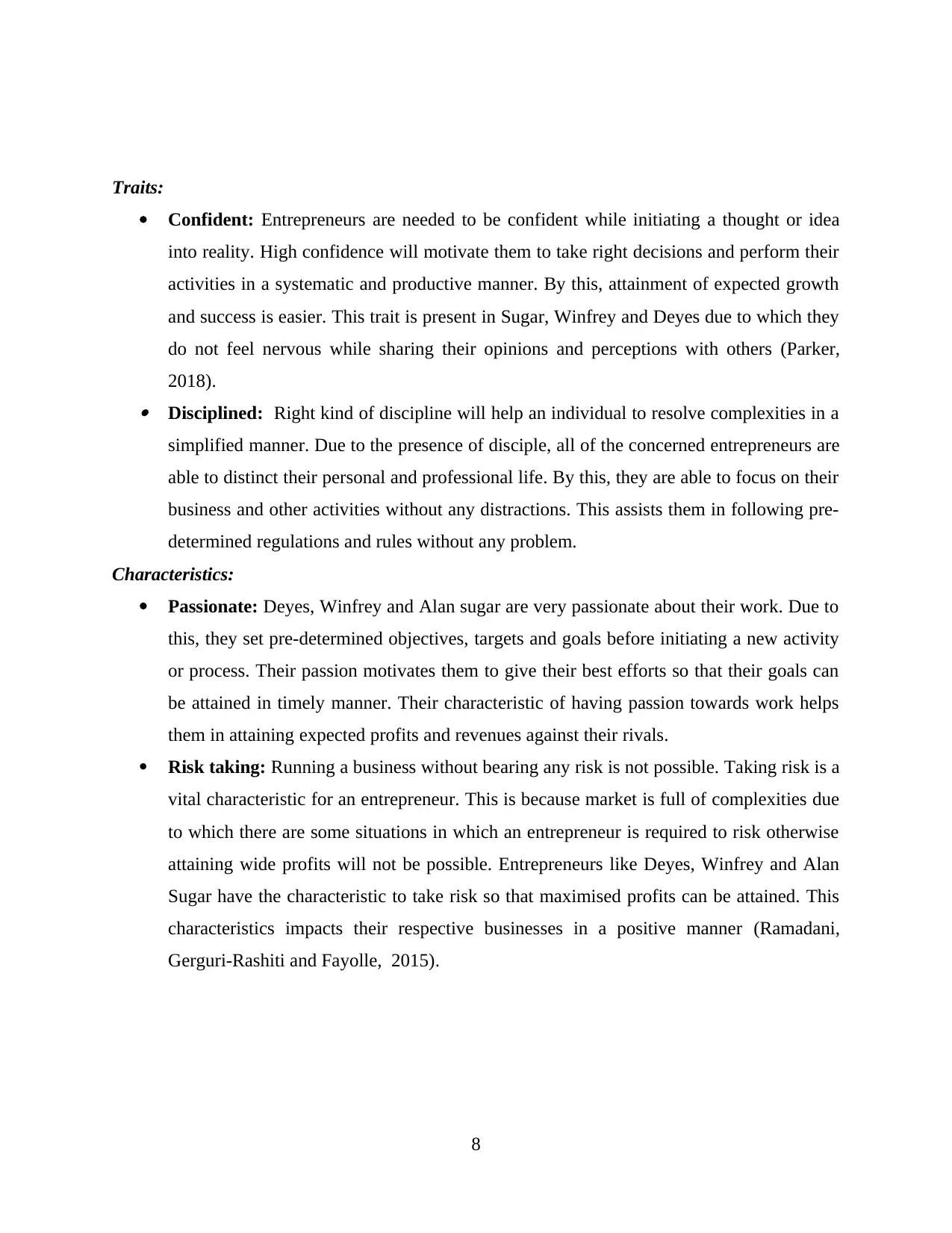
Traits:
Confident: Entrepreneurs are needed to be confident while initiating a thought or idea
into reality. High confidence will motivate them to take right decisions and perform their
activities in a systematic and productive manner. By this, attainment of expected growth
and success is easier. This trait is present in Sugar, Winfrey and Deyes due to which they
do not feel nervous while sharing their opinions and perceptions with others (Parker,
2018). Disciplined: Right kind of discipline will help an individual to resolve complexities in a
simplified manner. Due to the presence of disciple, all of the concerned entrepreneurs are
able to distinct their personal and professional life. By this, they are able to focus on their
business and other activities without any distractions. This assists them in following pre-
determined regulations and rules without any problem.
Characteristics:
Passionate: Deyes, Winfrey and Alan sugar are very passionate about their work. Due to
this, they set pre-determined objectives, targets and goals before initiating a new activity
or process. Their passion motivates them to give their best efforts so that their goals can
be attained in timely manner. Their characteristic of having passion towards work helps
them in attaining expected profits and revenues against their rivals.
Risk taking: Running a business without bearing any risk is not possible. Taking risk is a
vital characteristic for an entrepreneur. This is because market is full of complexities due
to which there are some situations in which an entrepreneur is required to risk otherwise
attaining wide profits will not be possible. Entrepreneurs like Deyes, Winfrey and Alan
Sugar have the characteristic to take risk so that maximised profits can be attained. This
characteristics impacts their respective businesses in a positive manner (Ramadani,
Gerguri-Rashiti and Fayolle, 2015).
8
Confident: Entrepreneurs are needed to be confident while initiating a thought or idea
into reality. High confidence will motivate them to take right decisions and perform their
activities in a systematic and productive manner. By this, attainment of expected growth
and success is easier. This trait is present in Sugar, Winfrey and Deyes due to which they
do not feel nervous while sharing their opinions and perceptions with others (Parker,
2018). Disciplined: Right kind of discipline will help an individual to resolve complexities in a
simplified manner. Due to the presence of disciple, all of the concerned entrepreneurs are
able to distinct their personal and professional life. By this, they are able to focus on their
business and other activities without any distractions. This assists them in following pre-
determined regulations and rules without any problem.
Characteristics:
Passionate: Deyes, Winfrey and Alan sugar are very passionate about their work. Due to
this, they set pre-determined objectives, targets and goals before initiating a new activity
or process. Their passion motivates them to give their best efforts so that their goals can
be attained in timely manner. Their characteristic of having passion towards work helps
them in attaining expected profits and revenues against their rivals.
Risk taking: Running a business without bearing any risk is not possible. Taking risk is a
vital characteristic for an entrepreneur. This is because market is full of complexities due
to which there are some situations in which an entrepreneur is required to risk otherwise
attaining wide profits will not be possible. Entrepreneurs like Deyes, Winfrey and Alan
Sugar have the characteristic to take risk so that maximised profits can be attained. This
characteristics impacts their respective businesses in a positive manner (Ramadani,
Gerguri-Rashiti and Fayolle, 2015).
8
Paraphrase This Document
Need a fresh take? Get an instant paraphrase of this document with our AI Paraphraser
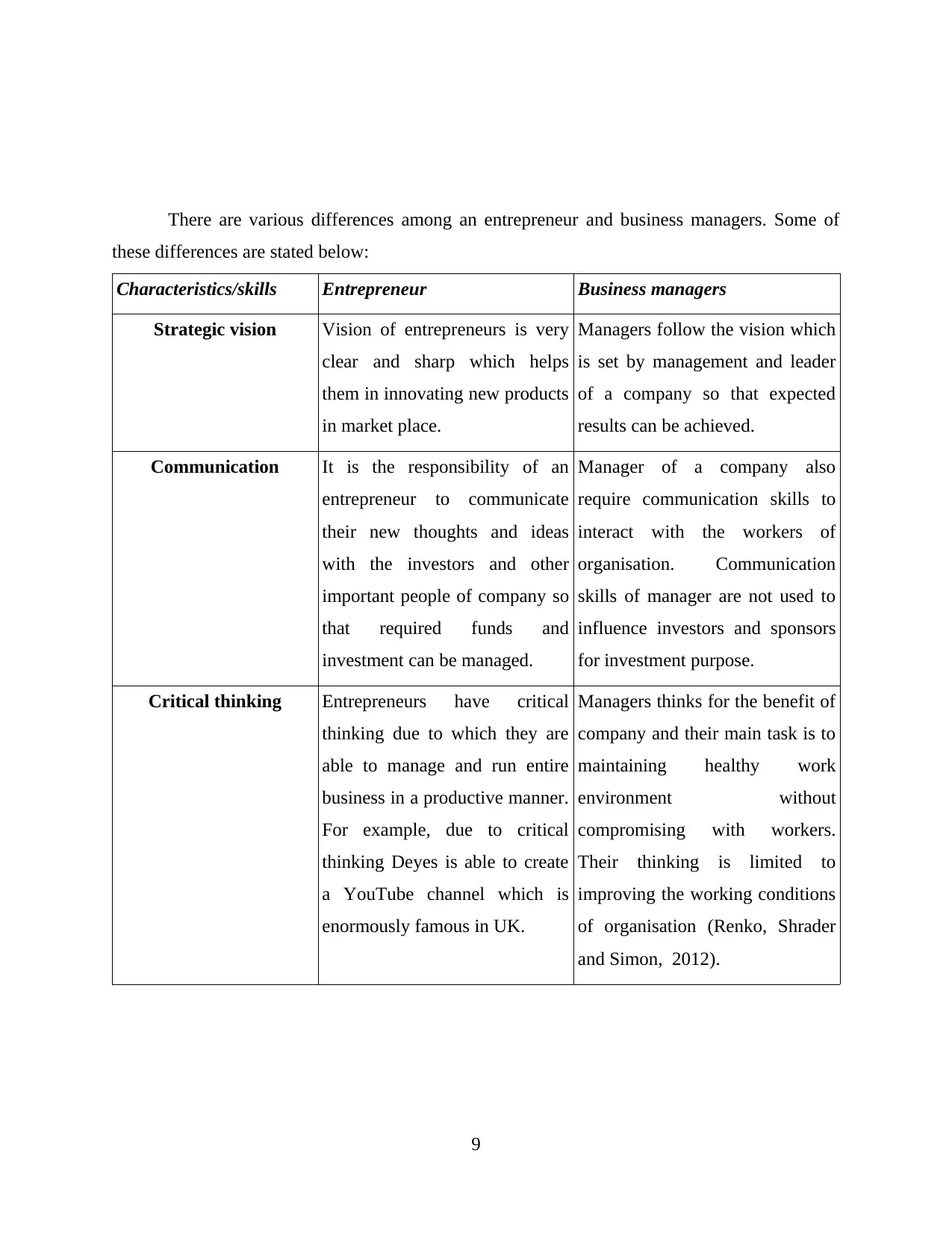
There are various differences among an entrepreneur and business managers. Some of
these differences are stated below:
Characteristics/skills Entrepreneur Business managers
Strategic vision Vision of entrepreneurs is very
clear and sharp which helps
them in innovating new products
in market place.
Managers follow the vision which
is set by management and leader
of a company so that expected
results can be achieved.
Communication It is the responsibility of an
entrepreneur to communicate
their new thoughts and ideas
with the investors and other
important people of company so
that required funds and
investment can be managed.
Manager of a company also
require communication skills to
interact with the workers of
organisation. Communication
skills of manager are not used to
influence investors and sponsors
for investment purpose.
Critical thinking Entrepreneurs have critical
thinking due to which they are
able to manage and run entire
business in a productive manner.
For example, due to critical
thinking Deyes is able to create
a YouTube channel which is
enormously famous in UK.
Managers thinks for the benefit of
company and their main task is to
maintaining healthy work
environment without
compromising with workers.
Their thinking is limited to
improving the working conditions
of organisation (Renko, Shrader
and Simon, 2012).
9
these differences are stated below:
Characteristics/skills Entrepreneur Business managers
Strategic vision Vision of entrepreneurs is very
clear and sharp which helps
them in innovating new products
in market place.
Managers follow the vision which
is set by management and leader
of a company so that expected
results can be achieved.
Communication It is the responsibility of an
entrepreneur to communicate
their new thoughts and ideas
with the investors and other
important people of company so
that required funds and
investment can be managed.
Manager of a company also
require communication skills to
interact with the workers of
organisation. Communication
skills of manager are not used to
influence investors and sponsors
for investment purpose.
Critical thinking Entrepreneurs have critical
thinking due to which they are
able to manage and run entire
business in a productive manner.
For example, due to critical
thinking Deyes is able to create
a YouTube channel which is
enormously famous in UK.
Managers thinks for the benefit of
company and their main task is to
maintaining healthy work
environment without
compromising with workers.
Their thinking is limited to
improving the working conditions
of organisation (Renko, Shrader
and Simon, 2012).
9
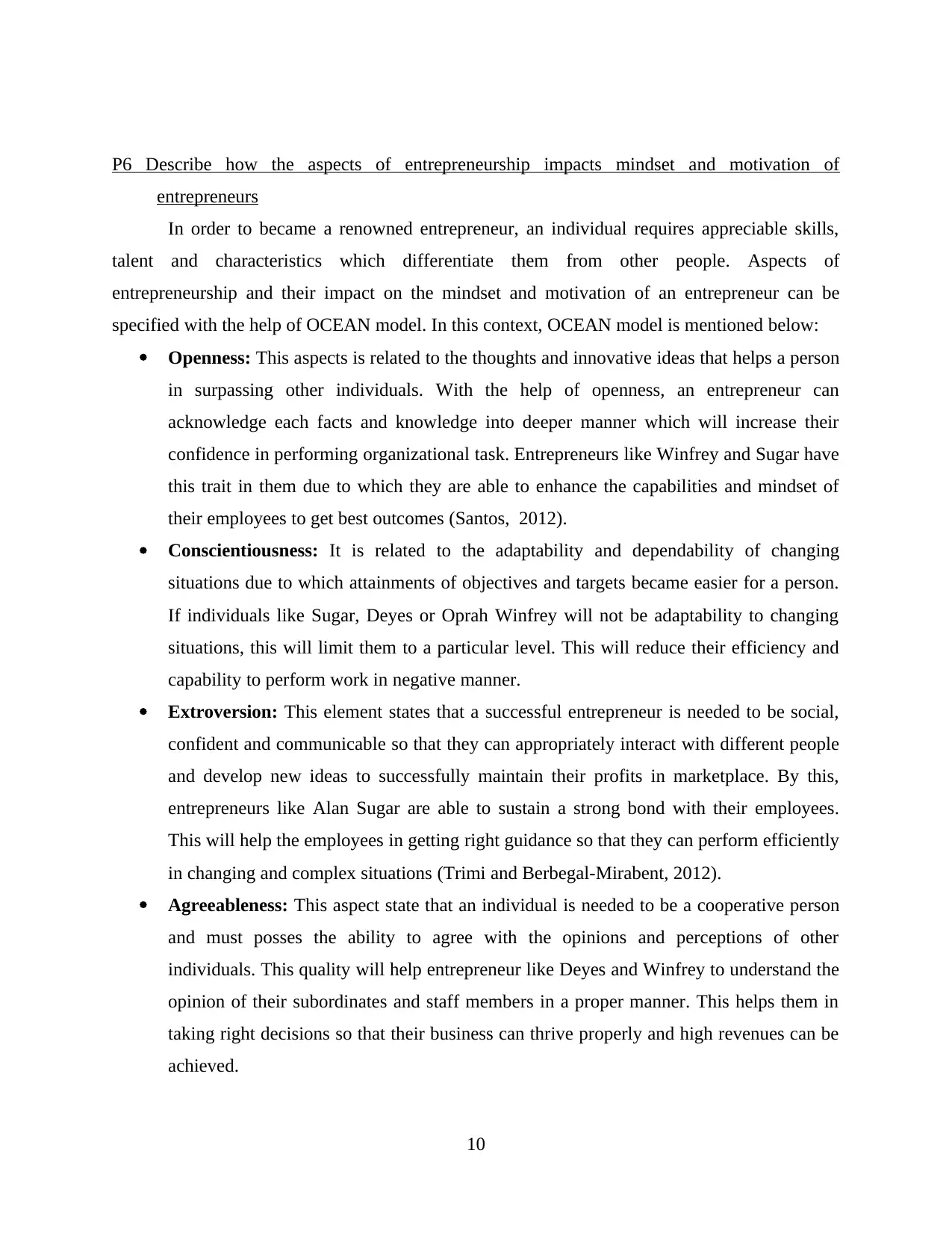
P6 Describe how the aspects of entrepreneurship impacts mindset and motivation of
entrepreneurs
In order to became a renowned entrepreneur, an individual requires appreciable skills,
talent and characteristics which differentiate them from other people. Aspects of
entrepreneurship and their impact on the mindset and motivation of an entrepreneur can be
specified with the help of OCEAN model. In this context, OCEAN model is mentioned below:
Openness: This aspects is related to the thoughts and innovative ideas that helps a person
in surpassing other individuals. With the help of openness, an entrepreneur can
acknowledge each facts and knowledge into deeper manner which will increase their
confidence in performing organizational task. Entrepreneurs like Winfrey and Sugar have
this trait in them due to which they are able to enhance the capabilities and mindset of
their employees to get best outcomes (Santos, 2012).
Conscientiousness: It is related to the adaptability and dependability of changing
situations due to which attainments of objectives and targets became easier for a person.
If individuals like Sugar, Deyes or Oprah Winfrey will not be adaptability to changing
situations, this will limit them to a particular level. This will reduce their efficiency and
capability to perform work in negative manner.
Extroversion: This element states that a successful entrepreneur is needed to be social,
confident and communicable so that they can appropriately interact with different people
and develop new ideas to successfully maintain their profits in marketplace. By this,
entrepreneurs like Alan Sugar are able to sustain a strong bond with their employees.
This will help the employees in getting right guidance so that they can perform efficiently
in changing and complex situations (Trimi and Berbegal-Mirabent, 2012).
Agreeableness: This aspect state that an individual is needed to be a cooperative person
and must posses the ability to agree with the opinions and perceptions of other
individuals. This quality will help entrepreneur like Deyes and Winfrey to understand the
opinion of their subordinates and staff members in a proper manner. This helps them in
taking right decisions so that their business can thrive properly and high revenues can be
achieved.
10
entrepreneurs
In order to became a renowned entrepreneur, an individual requires appreciable skills,
talent and characteristics which differentiate them from other people. Aspects of
entrepreneurship and their impact on the mindset and motivation of an entrepreneur can be
specified with the help of OCEAN model. In this context, OCEAN model is mentioned below:
Openness: This aspects is related to the thoughts and innovative ideas that helps a person
in surpassing other individuals. With the help of openness, an entrepreneur can
acknowledge each facts and knowledge into deeper manner which will increase their
confidence in performing organizational task. Entrepreneurs like Winfrey and Sugar have
this trait in them due to which they are able to enhance the capabilities and mindset of
their employees to get best outcomes (Santos, 2012).
Conscientiousness: It is related to the adaptability and dependability of changing
situations due to which attainments of objectives and targets became easier for a person.
If individuals like Sugar, Deyes or Oprah Winfrey will not be adaptability to changing
situations, this will limit them to a particular level. This will reduce their efficiency and
capability to perform work in negative manner.
Extroversion: This element states that a successful entrepreneur is needed to be social,
confident and communicable so that they can appropriately interact with different people
and develop new ideas to successfully maintain their profits in marketplace. By this,
entrepreneurs like Alan Sugar are able to sustain a strong bond with their employees.
This will help the employees in getting right guidance so that they can perform efficiently
in changing and complex situations (Trimi and Berbegal-Mirabent, 2012).
Agreeableness: This aspect state that an individual is needed to be a cooperative person
and must posses the ability to agree with the opinions and perceptions of other
individuals. This quality will help entrepreneur like Deyes and Winfrey to understand the
opinion of their subordinates and staff members in a proper manner. This helps them in
taking right decisions so that their business can thrive properly and high revenues can be
achieved.
10
⊘ This is a preview!⊘
Do you want full access?
Subscribe today to unlock all pages.

Trusted by 1+ million students worldwide
1 out of 17
Related Documents
Your All-in-One AI-Powered Toolkit for Academic Success.
+13062052269
info@desklib.com
Available 24*7 on WhatsApp / Email
![[object Object]](/_next/static/media/star-bottom.7253800d.svg)
Unlock your academic potential
Copyright © 2020–2026 A2Z Services. All Rights Reserved. Developed and managed by ZUCOL.





